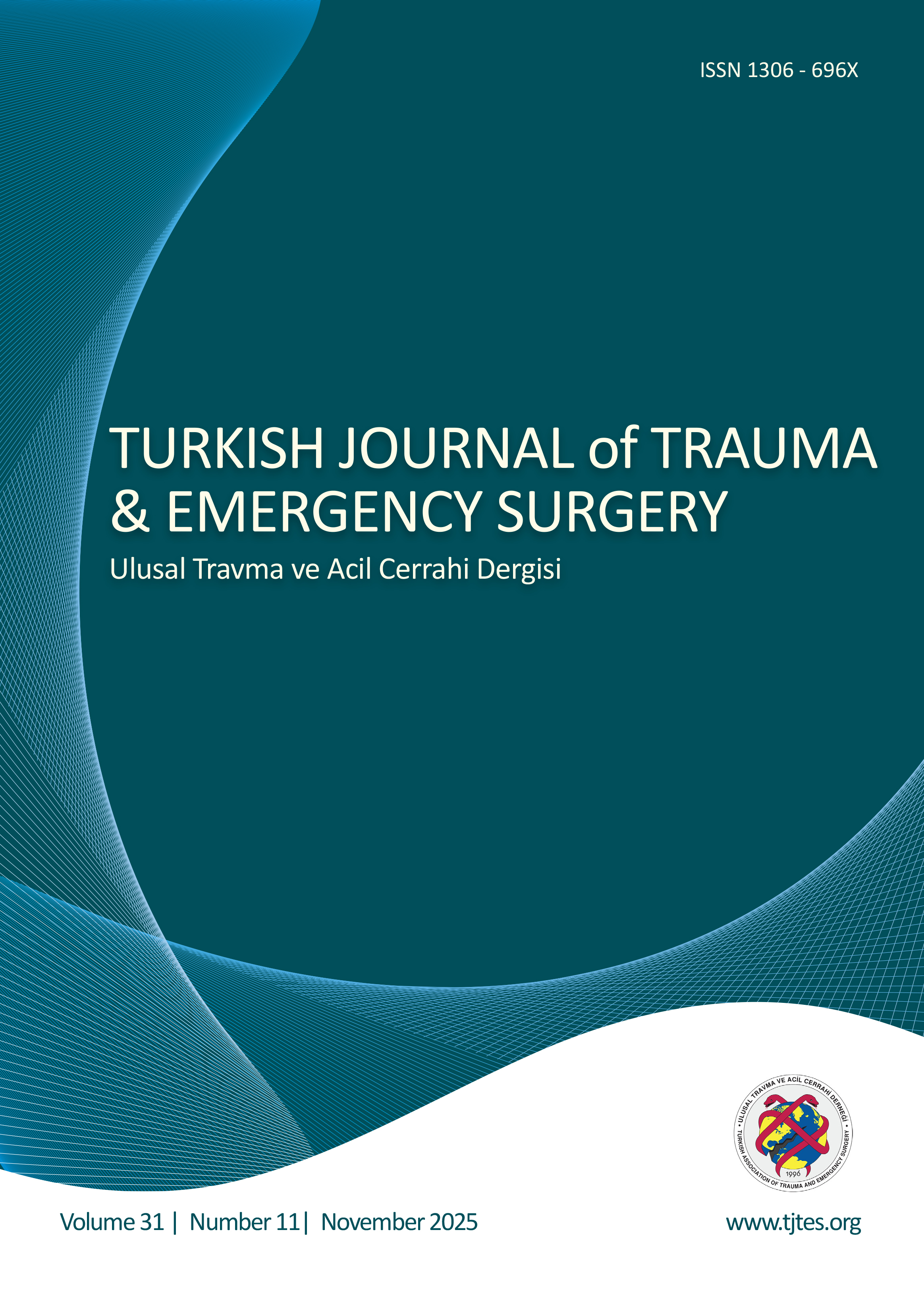Hızlı Arama
Ortopedistler bir sonraki afete psikolojik olarak hazır mı? 2023 Kahramanmaraş depremleri sonrasında ampütasyon uygulayan cerrahlar travmatik stres belirtileri yaşıyor.
Irmak Polat1, Melis Ceylan2, Sevde Nur Karabulut2, Meryem Merve Ören Çelik3, Serkan Bayram41İstanbul Üniversitesi, İstanbul Tıp Fakültesi, Psikiyatri Anabilim Dalı, Konsültasyon- Liyezon Psikiyatrisi Bilim Dalı, İstanbul2İstanbul Üniversitesi, İstanbul Tıp Fakültesi, Psikiyatri Anabilim Dalı, İstanbul
3İstanbul Üniversitesi, İstanbul Tıp Fakültesi, Halk Sağlığı Anabilim Dalı, İstanbul
4İstanbul Üniversitesi, İstanbul Tıp Fakültesi, Ortopedi ve Travmatoloji Anabilim Dalı, İstanbul
Amaç: Bu çalışmada, 2023 Kahramanmaraş depremleri sonrasında ortopedistlerin ruh sağlığı sonuçlarının, ortopedik bakım ve ampütasyonlarla ilişkisi bağlamında kapsamlı bir analizle değerlendirilmesi amaçlanmıştır.
Gereç ve Yöntem: 2023 Kahramanmaraş depremlerinden 6 ay sonra yürütülen, kesitsel araştırmamıza toplam 95 ortopedist dahil edilmiştir. Katılımcılara demografik ve mesleki bilgiler, deprem mağdurlarına sağlanan ortopedik tedaviler, ampütasyonlar ve stres faktörleri, deprem alanındaki deneyimler, Olay Etkisi Ölçeği-gözden geçirilmiş (OEÖ-r) ve Depresyon Anksiyete Stres Ölçeği-21 (DASÖ-21) maddelerini içeren çevrimiçi anket gönderilmiştir. OEÖ-r ve DASÖ-21 skorları, depremle ilişkili deneyimler, ortopedik tedavi ve ampütasyon uygulamalarına bağlı stres faktörlerine göre analiz edilmiştir.
Bulgular: Deprem bölgesindeki hastalara bakım sağlayan ortopedistlerin oranı %61,5 olup, bunun %16,8i afet bölgesinde yaşayan, %42,1i ise destek için bölgeye gelen ortopedistlerden oluşmaktadır.. Katılımcıların %36,8i ise bölge dışındaki sevk hastanelerinde tedavi uygulamıştır. Katılımcıların %76,8i deprem mağdurlarında ampütasyon ameliyatı gerçekleştirdiğini bildirmiştir. Pediatrik yaş grubunda ampütasyon (%82,2), hastaların kayıpları veya depreme bağlı diğer zorlukları (%64,4) ve çoklu ekstremite ampütasyonları (%56,2) en sık bildirilen stres faktörleri olmuştur. Sevk hastanelerindeki ve afet bölgelerinde yaşayan ortopedistler, bölgeye destek için sonradan gelen ortopedistlere oranla daha yüksek toplam OEÖ-r skorları (11,0 [058] ve 11,5 [046] vs. 1,0 [039]), kaçınma (3,0 [020] ve 3,0 [017] vs. 0,0 [013]) ve yeniden yaşantılama (4,0 [020] ve 5,0 [020] vs. 0,0 [014]) alt ölçek skorları bildirmiştir. Sevk hastanelerindeki ortopedistler ayrıca bölgeye gelenlere oranla daha yüksek anksiyete (2,0 [013] vs. 0,0 [07]), stres (5,0 [016] vs. 2,0 [012]) ve toplam DASÖ-21 skorları (11,0 [044] vs. 6,0 [029]) belirtmiştir. Depremle ilişkili zorlukları olan hastalara ampütasyon yapan ortopedistler, daha yüksek depresyon skorları bildirmiştir (4 [018] vs. 1 [015], p=0,013). OEÖ-r skorları yaşla negatif korelasyon göstermiştir (r=-0,203, p=0,049); diğer faktörler OEÖ-r veya DASÖ-21 skorları ile ilişki göstermemiştir.
Sonuç: Çalışmamız, deprem mağdurlarına uygulanan tedavilerin ortopedistlerin ruhsal etkilenme düzeyleri ve travmatik stres belirtileri üzerinde belirgin etkisi olduğunu göstermektedir. Özellikle afet bölgesinde yaşayan ve sevk hastanelerindeki ortopedistler daha fazla etkilenmiştir. Temel stres faktörleri arasında pediatrik ampütasyonlar, çoklu ekstremite ampütasyonları ve hastaların yaşadığı zorluklar yer almaktadır. Depremle ilişkili zorlukları olan hastalarda yapılan ampütasyonlar ortopedistlerin depresyon skorlarını artırmıştır. Ayrıca, genç ortopedistler, ileri yaştakilere oranla daha yüksek OEÖ-r skorları bildirmiştir. Bulgularımız, büyük çaplı afetlerin ardından ortopedistler için düzenli ruh sağlığı taraması, risk grubu belirleme, yapılandırılmış psikolojik destek ve dayanıklılık eğitimi ile gelecekteki acil durumlara karşı daha iyi hazırlık yapılması gerektiğine dikkat çekmektedir.
Are orthopedists mentally ready for the next disaster? Surgeons who performed amputations after 2023 Kahramanmaraş earthquakes report high traumatic stress symptoms
Irmak Polat1, Melis Ceylan2, Sevde Nur Karabulut2, Meryem Merve Ören Çelik3, Serkan Bayram41Division of Consultation- Liaison Psychiatry, Department of Psychiatry, Istanbul University Istanbul Faculty of Medicine, Istanbul, Turkiye2Department of Psychiatry, Istanbul University Istanbul Faculty of Medicine, Istanbul, Turkiye
3Department of Public Health, Istanbul University Istanbul Faculty of Medicine, Istanbul, Turkiye
4Department of Orthopedics and Traumatology, Istanbul Faculty of Medicine, Istanbul University Istanbul, Turkiye
Background: To evaluate the mental health outcomes of orthopedists after 2023 Kahramanmaraş earthquakes via a comprehensive analysis as a function of orthopedic care and amputations.
Methods: This cross-sectional questionnaire-based study, which took place six months after the 2023 Kahramanmaraş earthquakes, included a total of 95 orthopedists. The online questionnaire assesed demographic characteristics, professional experience, and mental health outcomes using Impact of Event Scale-revised (IES-R), and Depression Anxiety Stress Scale-21 (DASS-21). The scale scores were analyzed according to earthquake zone challenges, orthopedic care provision, and amputation-related stress factors.
Results: Care for earthquake victims was provided by 61.5% of orthopedists in the earthquake area, including local (16.8%) and supporting orthopedists (42.1%), while 36.8% treated victims at referral hospitals outside the area. Overall, 76.8% of participants reported that they have performed amputation surgery in earthquake victims, while performing amputation in the pediatric age group (82.2%), patients losses or other difficulties related to earthquake (64.4%) and amputation of multiple extremities (56.2%) were reported as the three most common stressing factors related to amputations. Orthopedists at referral hospitals and local orthopedists reported higher total IES-R scores (11.0 [058] and 11.5 [046] vs. 1.0 [039]), avoidance (3.0 [020] and 3.0 [017] vs. 0.0 [013]) and intrusion (4.0 [020] and 5.0 [020] vs. 0.0 [014]) subscales. Referral hospital orthopedists showed higher anxiety (2.0 [013] vs. 0.0 [07]), stress (5.0 [016] vs. 2.0 [012]), and total DASS-21 scores (11.0 [044] vs. 6.0 [029]) than supporting orthopedists in the disaster zone. Those considering amputation in patients with earthquake-related difficulties reported higher DASS-21 depression scores (4[0-18] vs. 1[0-15], p=0.013). IES-R scores were negatively correlated with age (r=-0.203, p=0.049), while other factors showed no correlation with IES-R or DASS-21 scores.
Conclusion: Our study shows that treating earthquake victims has a significant impact on orthopedists' emotional states and traumatic stress, especially for local and referral hospital orthopedists. The key stress factors included pediatric amputations, multiple extremity amputations, and patient difficulties. While tragic events with relatives did not show significant association with the scores, performing amputations on patients with earthquake-related difficulties increased depression scores, and younger orthopedists reported higher IES-R scores than older orthopedists. Our findings call attention to the need for regular mental health screening, risk group identification, structured psychological support and resilience training among orthopedic surgeons following large-scale disasters, and enhanced preparedness for future emergencies.
Makale Dili: İngilizce





